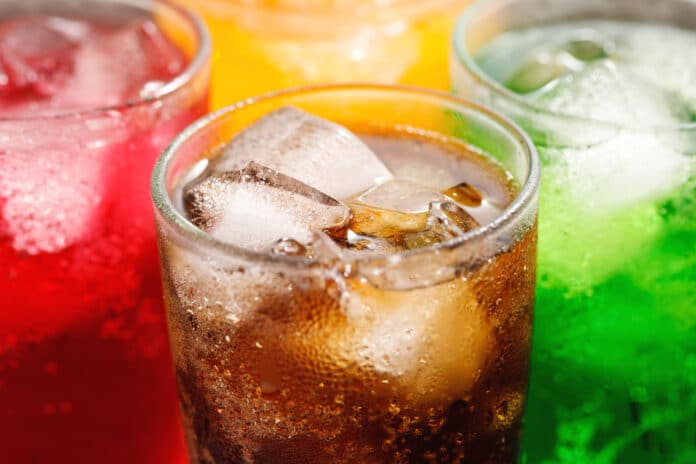The study, embargoed until March 5, 2024, and eventually published in Circulation: Arrhythmia and Electrophysiology, presents essential conclusions about beverage intake and heart health. It shows that drinking many sugar-sweetened beverages—artificial or sugar-based—increases the risk of irregular heartbeats by 10% and 20%, respectively.
On the other hand, people who consume one liter or less of pure juice per week—such as vegetable or orange juice—have an 8% lower chance of experiencing cardiac rhythm problems. Despite these findings, the study does not prove a direct causal connection between cardiac rhythm issues and sweetened beverages.
The study found that consuming less than one liter (approximately 34 ounces) of pure, unsweetened juice, such as vegetable or orange juice, every week was associated with a decreased risk of atrial fibrillation (AFib). It was unable to determine if sweetened beverages directly contributed to AFib. However, the association persisted even after considering a person’s genetic risk. Consuming sweetened beverages has been connected in the past to Type 2 diabetes and obesity.
One of the first studies to look into a possible link between sugar- or artificially-sweetened beverage consumption and AFib is this extensive one conducted in the UK Biobank. The irregular heartbeat associated with AFib raises the risk of stroke considerably. According to the American Heart Association, nearly 12 million people will have AFib by 2030.
Lead study author Ningjian Wang, M.D., Ph.D., a researcher at the Shanghai Ninth People’s Hospital and Shanghai Jiao Tong University School of Medicine in Shanghai, China, said, “Our study’s findings cannot definitively conclude that one beverage poses more health risk than another due to the complexity of our diets and because some people may drink more than one type of beverage.”
“However, based on these findings, we recommend that people reduce or even avoid artificially sweetened and sugar-sweetened beverages whenever possible. Do not take for granted that drinking low-sugar and low-calorie artificially sweetened beverages is healthy; it may pose potential health risks.” He added.
Researchers found over 9,362 occurrences of atrial fibrillation (AFib) across nearly a decade in a survey of over 200,000 persons without AFib from the UK Biobank between 2006 and 2010. According to their research, drinking more than two liters of artificially sweetened beverages each week increased the incidence of AFib by 20%. Simultaneously, the comparable consumption of beverages with added sugar rose by 10%. On the other hand, consuming one liter or less of pure fruit juice per week was linked to an 8% decreased incidence of AFib.
Individuals who used more artificial sweeteners were more likely to be younger, female, have a higher body mass index, and have diabetes. Simultaneously, those who drank beverages sweetened with sugar were mainly younger men who had higher BMIs, more significant cardiac disease, and poorer socioeconomic positions.
Juice and drinks sweetened with sugar were consumed by people who consumed more sugar overall. It’s interesting to note that smoking and heavy consumption of sugar-sweetened beverages were associated with a 31% increased incidence of AFib. However, neither former smokers nor non-smokers showed this association.
Wang said, “These new findings suggest that cutting down on sweetened drinks could help reduce the risk of atrial fibrillation, a heart condition.”
The researchers also investigated the possibility that genetic variables contributed to this relationship. Regardless of genetic susceptibility, they discovered that drinking more than two liters of artificially sweetened beverages per week raised the chance of AFib.
Wang clarified that although the exact cause of the increased risk of AFib in people drinking sweetened beverages is unknown, possible explanations include insulin resistance and the body’s reaction to various sweeteners. She also mentioned the widespread use of artificial sweeteners in food and drink, including sucralose, aspartame, saccharin, and acesulfame.
The American Heart Association’s 2018 science advice emphasized the dearth of extensive, long-term studies on the efficacy and safety of artificial sweeteners. According to the warning, children should refrain from ingesting low-calorie, sweetened beverages for prolonged periods.
However, it conceded that artificially sweetened beverages may be a valuable substitute for people who routinely consume sugary drinks. Co-author of the advice Penny M. Kris-Etherton, a member of the American Heart Association’s nutrition committee, expressed astonishment at the results, pointing out that consuming two liters of artificially sweetened liquids every week is equivalent to about one 12-ounce diet Coke daily.
Kris-Etherton stressed that this is the first study to show a connection between a higher risk of atrial fibrillation and low—and no-calorie sweeteners and beverages with added sugar. She also mentioned conflicting information about the adverse health effects of artificial sweeteners despite a substantial correlation between cardiovascular disease and drinks sweetened with sugar.
More research is required to validate these results and completely comprehend the health implications of these beverages for heart disease and other ailments. In the interim, water is the best option, and this study suggests limiting or avoiding drinks with added sugar and low calories.
Journal reference:
- Ying Sun, Bowei Yu et al., Sweetened Beverages, Genetic Susceptibility, and Incident Atrial Fibrillation: A Prospective Cohort Study. Circulation: Arrhythmia and Electrophysiology. DOI: 10.1161/CIRCEP.123.012145.
